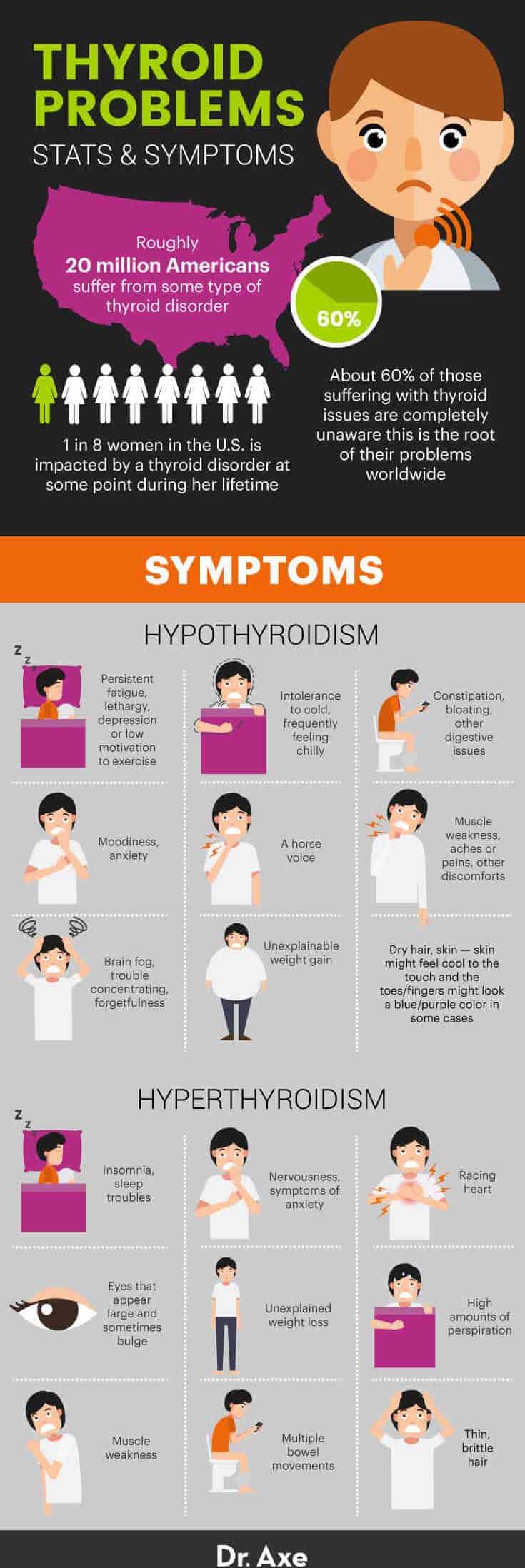This Dr. Axe content is medically reviewed or fact checked to ensure factually accurate information.
With strict editorial sourcing guidelines, we only link to academic research institutions, reputable media sites and, when research is available, medically peer-reviewed studies. Note that the numbers in parentheses (1, 2, etc.) are clickable links to these studies.
The information in our articles is NOT intended to replace a one-on-one relationship with a qualified health care professional and is not intended as medical advice.
This article is based on scientific evidence, written by experts and fact checked by our trained editorial staff. Note that the numbers in parentheses (1, 2, etc.) are clickable links to medically peer-reviewed studies.
Our team includes licensed nutritionists and dietitians, certified health education specialists, as well as certified strength and conditioning specialists, personal trainers and corrective exercise specialists. Our team aims to be not only thorough with its research, but also objective and unbiased.
The information in our articles is NOT intended to replace a one-on-one relationship with a qualified health care professional and is not intended as medical advice.
Symptoms of Thyroid Problems & Remedies That Help
July 28, 2023

Because the thyroid gland serves as the body’s thermostat — continuously regulating things like temperature, hunger levels and energy expenditure — symptoms of thyroid problems can affect nearly the whole body.
Experts estimate there are roughly 20 million Americans suffering from some type of thyroid disorder (mostly hypothyroidism/underactive thyroid and, to a lesser extend, hyperthyroidism). Surprisingly, it’s thought that more than half of those (60 percent) with thyroid symptoms, such as weight gain or fatigue, are completely unaware of the root cause of their problems.
Are you currently one of them, and if so, what can you do to protect your condition from worsening? Below you’ll learn about natural remedies for thyroid disease or other thyroid problems, including the types of foods that keep symptoms under control, ways to manage stress and supplements that might help reverse the condition.
What Is Your Thyroid?
The thyroid is a small, butterfly-shaped gland located in your throat, just behind your Adam’s apple.
The thyroid gland controls many aspects of metabolism, including regulating the production of various hormones that enable the body to carry out vital functions — such as digestion and reproduction, for example.
Thyroid stimulating hormone is produced by the pituitary gland in order to regulate the production of hormones released by the thyroid. Sometimes the thyroid winds up pumping out either too much or too little of certain hormones. Either scenario is problematic for things like body weight regulation and mood stabilization.
Two of the most important thyroid hormones are T3 (triiodothyronine) and T4 (thyroxine). These two hormones, once released, travel through the body via the bloodstream, converting oxygen and calories into energy. This energy is crucial for cognitive functions, mood regulation, digestive processes, a healthy sex drive and much more.
Most Common Thyroid Problems
Thyroid disorders and thyroid disease can have a negative impact on just about every area of your life. From weight issues to depression and/or anxiety, the thyroid gland is vital to keeping your physical, mental and emotional life in balance.
What are the types of thyroid problems a person can experience?
There are two main categories of thyroid problems: hypothyroidism (an under-active thyroid) and hyperthyroidism (an overactive thyroid).
While there are other thyroid issues as well, the majority of cases fall into one of these two categories.
Hypothyroidism (under-active thyroid):
Hypothyroidism is by far the more common type of thyroid problem. Most people with hypothyroidism are women, especially those who are of reproductive age or middle-aged. Most women are diagnosed between the ages of 30 to 50 years.
In the case of hypothyroidism, your body literally slows down. This is why symptoms like weight gain, brain fog and sluggishness are common.
These occur due to the thyroid not producing enough of the thyroid hormones T3 or T4 (or both). It can also cause elevated thyroid stimulating hormone levels.
Hyperthyroidism (over-active thyroid):
Hyperthyroidism causes the opposite effect of hypothyroidism. It almost speeds up one’s metabolism, to the point that the heart may beat faster and the person may have a hard time eating properly or keeping enough weight on.
Hyperthyroidism occurs when the body has too much of the needed thyroid hormones.
Enlarged thyroid/goiter:
Another condition is an enlarged thyroid, also called a goiter, that develops in the neck, which is usually caused by a lack of iodine in someone’s diet. (Iodine is needed to support thyroid function.) In countries where iodized salt is common, goiters are rare, however they can develop when someone doesn’t eat a balanced diet for an extended period of time.
There are different types of goiters that can develop, including lithium-induced goiter, nontoxic goiter and toxic nodular goiter.
Symptoms of Thyroid Problems
The most common symptoms of hypothyroidism are:
- Persistent fatigue (aka adrenal fatigue), lethargy, and sometimes depression or low motivation to exercise
- Moodiness and sometimes anxiety
- Intolerance to cold and frequently feeling chilly
- Dry skin and hair — skin might feel cool to the touch and the toes/fingers might look a blue/purple color in some cases
- Brain fog, trouble concentrating and forgetfulness
- A hoarse voice
- Unexplainable weight gain
- Constipation, bloating and other digestive issues
- Muscle weakness, sometimes aches or pains, and other discomforts
Symptoms of hyperthyroidism commonly include:
- Nervousness or symptoms of anxiety
- Insomnia and sleep troubles
- Racing heart rate
- Eyes that appear large and sometimes bulge
- Unexplained weight loss
- High amounts of perspiration
- Muscle weakness
- Multiple bowel movements
- Thin, brittle hair
What are early warning signs of thyroid problems?
When the gland first becomes dysfunctional, symptoms might include:
- Dry skin
- Fatigue and lack of focus
- Feeling cold
- Constipation
- Weight gain
- Puffy, swollen-looking face
- Muscle weakness and trouble exercising
What are the symptoms of thyroid problems in females?
As many as one in eight women in the United States may be impacted by a thyroid disorder at some point during her lifetime. Symptoms can include:
- Thinning hair
- Loss of breast tenderness
- Fatigue
- Weight gain
- Low libido
- Cold body temperature
- Irregular menstrual cycles
- Infertility
What symptoms does thyroid cancer cause?
Some signs of cancer potentially developing in the gland can include:
- A lump (nodule) that can be felt on the neck
- Hoarseness
- Difficulty swallowing and breathing normally
- Swollen lymph nodes in the neck
- Pain in the neck and throat
- Persistent cough

Causes
What causes thyroid problems? It depends on the specific problem.
There are many factors that can contribute to thyroid problems, ranging from genetics to poor lifestyle habits — like skipping sleep, exercising too much or too little, and eating too many inflammatory foods.
Causes of Hypothyroidism:
In the U.S., by far the most common reason for hypothyroidism is a condition called Hashimoto’s thyroiditis, where the body mistakenly attacks the thyroid and destroys cells, thus compromising its functioning. It’s also sometimes called chronic autoimmune thyroiditis and chronic lymphocytic thyroiditis.
Hashimoto’s is a type of autoimmune disorder. It takes place due to an autoimmune response (the body attacking its own tissue with T and B cells), interfering with normal production of hormones. It affects women seven to 10 times more often than men due to chromosomal susceptibilities.
Causes of Hashimoto’s disease can include high amounts of stress, nutrient deficiencies (such as low iodine), low immune function (immunosuppression) and toxicity. However, on a worldwide level, an iodine deficiency in the diet is the No. 1 cause of hypothyroidism.
Causes of Hyperthyroidism:
The prevalence of hyperthyroidism in the U.S. is approximately 1.2% of adults. The No. 1 cause of hyperthyroidism is Graves’ disease, but lumps on the thyroid (having a goiter) or taking too much T4 in tablet form can also contribute to hyperthyroidism. The underlying cause is excess production of thyroid hormone.
Nutrient Deficiencies:
Several nutrients, such as iodine and selenium, play an important yet often overlooked role in regard to the thyroid functioning properly. Iodine and amino acids (the “building blocks” of proteins) are converted by the thyroid to the hormones T3 and T4.
Research shows that some of the most significant known risk factors for thyroid problems include:
- Deficiencies in three important nutrients that support healthy thyroid function — iodine, selenium and zinc deficiency
- Poor diet high in processed foods with things like sugar or unhealthy fats. Too much caffeine and/or alcohol can also contribute to emotional stress and poor gut health.
Either too much or too little iodine can disrupt thyroid function. The same can happen when someone lacks B vitamins, zinc and other minerals, including electrolytes.
Additionally, problems absorbing and converting nutrients from the diet can make matters worse. Leaky gut syndrome (also referred to as intestinal permeability) is one contributing cause to symptoms of thyroid problems since it raises inflammation levels and interferes with certain metabolic processes.
Stress:
Emotional stress, anxiety, fatigue and depression can interfere with normal adrenal functioning and wear down the entire immune system and endocrine system. Lack of sleep and overexercising are other causes of stress.
Poor Gut Health:
Some thyroid symptoms can be related to leaky gut syndrome, which triggers inflammation. This impairs normal nutrient absorption, can lead to autoimmune reactions, can reduce oxygen reaching the organs and causes less blood flow through the gastrointestinal tract.
It may also interfere with enzyme production, which makes it harder to digest certain things (especially grains, dairy and fats).
Other Risk Factors (Inactivity, Genetics, Toxin Exposure):
A lack of exercise and a sedentary lifestyle may contribute to overall poor health and hormonal imbalances.
Reactions to some immunosuppressive medications can also impact the thyroid and adrenals. So can toxicity due to chemical exposure or contact with other environmental pollutants.
Other potential causes include genetic factors (research shows that thyroid problems tend to run in families), pregnancy, or in the case of infants or young children, a genetic pituitary disorder, defective thyroid or lack of the gland entirely.
Natural Treatments and Prevention
Because the two main types of thyroid problems, hypothyroidism and hyperthyroidism, are basically the opposite problems, treatment for each condition is very different.
In one case we want more of the thyroid hormones, and in the other case the sufferer needs less of that same hormone. Therefore it’s important to find the root causes of someone’s symptoms and tailor treatment accordingly.
Here’s how thyroid problems are usually treated with conventional medicine:
- When it comes to hypothyroidism, the body is in need of more thyroid hormones. One common treatment in the medical world is taking synthetic thyroxine or T4. There are a number of types of T4 prescription available. Most people respond to this therapy, but there are also those who don’t. In these cases the sufferer sometimes takes a combination of the synthetic version of T4 and T3 to help.
- In the case of hyperthyroidism, the most common treatment in the U.S. is the use of radioactive iodine, aka radioiodine. Anti-thyroid medications are used to reduce and normalize thyroid function. This treatment usually takes a few weeks or months to curb the hyperthyroidism.
- Other options are drugs that stop the production of the thyroid hormone or surgery to remove a large amount of the actual thyroid gland. All of these treatments run the risk of side effects, are costly and aren’t always effective.
Natural Treatments:
1. Get Enough Iodine, Selenium, Zinc
Many (but not all) patients with hypothyroid diseases are deficient in iodine — most cases of hypothyroidism worldwide are from a lack of iodine — therefore increasing your iodine intake can likely help.
Iodine is a key mineral for helping convert and release thyroid hormone, yet iodine-rich foods (like edible seaweed such as kombu and wakame) are limited in the typical Western diet.
Other than consuming sea veggies like dulse or kelp, you can obtain iodine from foods like raw dairy, certain wild-caught fish, like tuna, and some fermented grains. You might also benefit from iodine supplements in low doses (usually best when being monitored for side effects).
Too much iodine (such as taking high doses of supplements) actually aggravates thyroid disorder symptoms, so follow dosage directions, and seek your doctor’s advice if you’re unsure.
Selenium helps balance levels of T4 hormones, so try to eat plenty foods high in selenium like Brazil nuts, spinach, yellowfin tuna, halibut, canned sardines, grass-fed beef, turkey and beef liver. Those with celiac disease or autoimmune disorders may be most deficient in selenium, so a supplement might be necessary in these cases.
Similarly, the mineral zinc and also B vitamins (especially vitamin B12) are needed for endocrine health and may be missing in your diet, especially if you rarely consume animal foods. The best sources are usually animal proteins (beef, turkey, eggs, etc.), plus plants like green peas, asparagus, chickpeas, cocoa, Brussels sprouts, sesame seeds, flaxseeds, nuts like pistachios and mushrooms.
2. Manage Stress and Rest Enough
When you’re under a good deal of either physical or emotional stress — such as feeling very anxious, overworked, fatigued, angry or going through a traumatic experience — your body may remain in a “fight-or-flight” mode where stress hormones like adrenaline and cortisol are elevated.
This has negative effects like narrowing of blood vessels, increased muscular tension and blood pressure, and release of inflammatory proteins and antibodies that can suppress immune function and damage the adrenal/thyroid glands. This is one reason why people with thyroid problems often experience hormonal changes related to lowered libido, fertility problems, mood swings and so on.
To keep the endocrine glands from becoming overloaded, it’s important to take stress seriously and tackle the root causes of mental strain.
Employ multiple methods to handle stress like utilizing these natural stress relievers:
- getting seven to nine hours of sleep every night
- meditation
- exercising
- journaling
- joining a faith community or support group
- dealing with addictions
- scheduling time to do fun things with supportive people

3. Reduce Toxicity
Ingesting chemical toxins — from things like medications, hormonal birth control or other hormone replacements, and commercial beauty or cleaning products — can contribute to inflammatory reactions.
Use natural products at home on your body, decrease intake of any unnecessary medications, clean up your diet and quit smoking.
Hormone conditions can also possibly be caused from heavy metal toxicity like mercury. Heavy metals from amalgam fillings have an affinity for the thyroid and can disrupt your hormone balance and thyroid function.
4. Supplement When Necessary to Reduce Inflammation
In addition to eating foods that provide anti-inflammatory omega-3 fatty acids — like wild-caught fish, flaxseeds and walnuts — it’s wise to consider a supplement as well.
Probiotics are also very beneficial for dealing with poor gut health and improving immunity. Both may help stabilize your mood and support adrenal/thyroid functions.
Probiotics, “good bacteria” that reside in your gut and communicate with your brain about the body’s overall state of health, can be found in foods like fermented dairy (yogurt or kefir), cultured veggies and also supplements.
Taking adaptogenic herbs can also help your body battle the negative effects of stress by supporting the adrenals and balancing hormones. These include ashwagandha, tulsi, ginseng, licorice root and rhodiola.
And then, last but not least are proteolytic enzymes. Enzymes reduce inflammation, especially if you have an autoimmune-related thyroid condition like Hashimoto’s disease.
Taking proteolytic enzymes like bromelain can benefit thyroid health by reducing inflammation of the thyroid.
When to See a Doctor
Some symptoms of thyroid problems, like fatigue, muscular pains, mood changes and depression, can also be caused by various other disorders, so it’s best to find a doctor who can help review your health information. Once you confirm you have a thyroid disorder, such as by having a blood test done, you can begin to explore your treatment options.
If you (and your doctor) determine a lack of iodine could be the entire cause or a contributing factor to your hypothyroidism, consider adding kelp to your diet.
It’s also critical to stop taking supplements and get a professional opinion if your symptoms get worse, because this may mean you’re treating one type of thyroid problem (hypothyroidism caused by low iodine and other nutrients, for example) when you really need to be treating another (hyperthyroidism).
Also consider visiting a health care provider if you have a family history of thyroid cancer and start to notice symptoms indicating a change in hormone production.
Conclusion
- The thyroid gland serves as the body’s “thermostat,” helping continuously regulate things like temperature, hunger levels, sex drive, mood and energy expenditure through the release of certain hormones.
- The two most common thyroid problems are hypothyroidism (often tied to Hashimoto’s, an autoimmune disease) and hyperthyroidism. Women are affected much more often, especially with Hashimoto’s thyroiditis
- How do you feel when you have thyroid problems? You might experience issues such as weight changes, anxiety, low energy, thinning hair, a slowed heart rate, trouble sleeping, and changes in libido, fertility and digestion.
- Natural remedies include improving your diet, reversing deficiencies, reducing stress, staying active and avoiding toxicity/chemical exposure.



